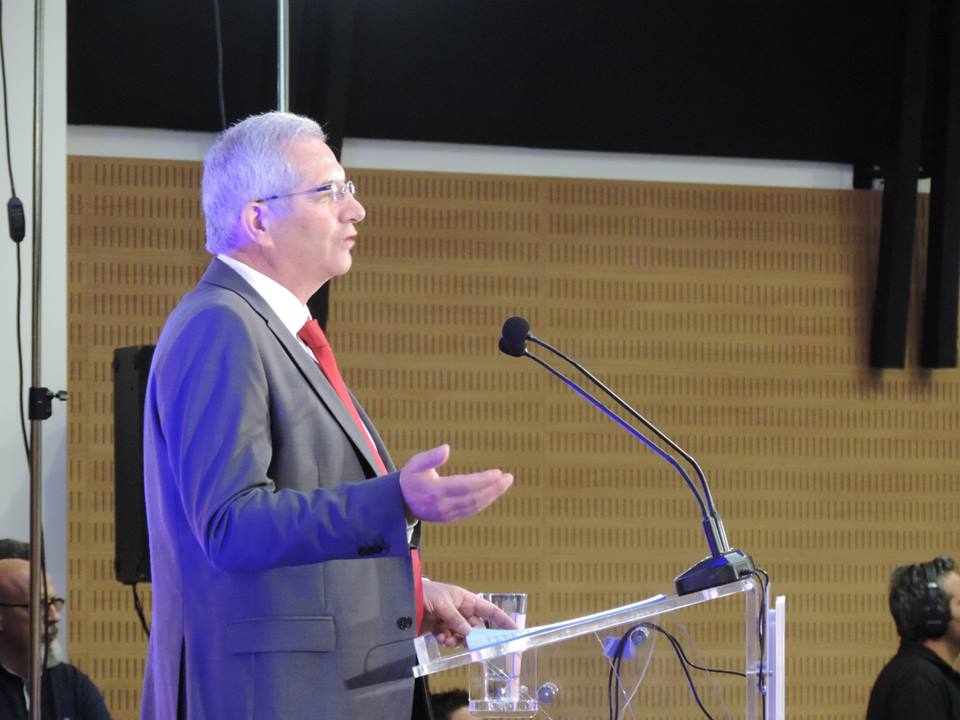
AKEL’s position on the form and content of the solution of the Cyprus Problem
Speech of Andros Kyprianou, General Secretary of the C.C. AKEL, at the Lyssarides Foundation [i]
26th January 2015, Nicosia
 Permit me to first of all thank the Lyssarides Foundation for their kind invitation to attend and speak at its first event with a political content. I wish its functioning will contribute towards a collective reflection on the major issues our country is facing.
Permit me to first of all thank the Lyssarides Foundation for their kind invitation to attend and speak at its first event with a political content. I wish its functioning will contribute towards a collective reflection on the major issues our country is facing.
The discussion on whether there is a need to rethink and redefine the form and content of the Cyprus problem is not new. It has been continuing for many years, while the National Council[1]l has also dealt with the matter. A similar discussion is due to take place in the forthcoming session of the Council over several days.
AKEL’s steadfast position is that of course one needs, depending on the given conditions, to adapt one’s tactics. However, in our opinion, the redefinition of the form and content of the solution of the Cyprus problem is not advisable.
Since 1977, in the High-Level Makarios – Denktash Agreement, bi- communal, bi-zonal federation has been agreed as the form of the solution with all that this implies concerning its concrete content. I know that it will be said that the agreement does not refer to “bi-zonal”. However, this is only partially true. Indeed, in this agreement the term “bi-zonal” does not exist, but the content of the concept does exist. More specifically, there is a reference to the territory will be under the administration of each community. Precisely the content of bi-zonality is none other than the existence of two zones (or states as they are called in the United States or “Länder” as they are called in Germany or cantons as they are called in Switzerland or provinces as they are called in Canada. This is not of fundamental significance. Each of these will be administered by the respective community. A comparison is wrongly being made with the zones in Germany after the Second World War, since they had nothing whatsoever to do with the state structure of the country and therefore totally different situations are being compared.
With regards the “label/name”, this subsequently was also accepted. All the UN plans that have been submitted after the 1977 and 1979 the High-Level Agreements explicitly provide for a bi-zonal federation regarding the territorial aspect. That is to say, they adopt the term and attach the content mentioned above. The same is the case with a multitude of resolutions approved by the UN Security Council. Not one of the above has been rejected because there is a reference to the term bi-zonal. We don’t need to look too far, the 8th July Agreement itself, under the heading “Set of Principles” explicitly provides for a bi-zonal, bi-communal federal solution.
Of course, the familiar argument that the name doesn’t matter but only the content of the solution is widely put forth. This is only partially true. In today’s world there are around twenty federal states which occupy approximately half the area of the planet, representing 40% of the world’s population. You cannot find even two that are exactly the same between them. Each one has its own historical, geographical, territorial, demographic or other characteristics and features that determine the specific content of their federal state structure.
At the same, however, there are also common characteristic features of all the federal states, without which the term “federation” would be just an empty term devoid of any content. Briefly, all the federal states have a single international personality, a single sovereignty and a single citizenship and they respect fundamental freedoms. It is precisely these features which distinguish the federal state from a confederal state. That is why we fully agree that in our future federal state the above principles must be respected. We cannot, however, put an end here.
The federal states also have common characteristic internal features: Each federal state is made up of at least two regions, each of which has its own constitution and its own organs of power. Since there are federal and federated power bodies, there is also a division of competences between them. Therefore, if indeed we accept the federation we must accept that in our own federal state there will be regions with their own constitution, their own government, parliament, courts and with their own competences. If we do not accept this, then we reject the solution of federation.
From there on, our own federation will also have its specifics and peculiarities which I have already to a large degree referred to: bi-communality, bi-zonality and political equality. Bi-communality, which is enshrined in the Constitution of the Republic of Cyprus, means institutionalized participation of the two communities in the organs of power and in the decisions they take. Bi-zonality, as I have stated before, means two regions, each of which will be administered by the respective community. As far as political equality is concerned, according to the definition given by the UN side which our side has adopted, it constitutes a coupling of the federal system with bi-communality. It does not mean numerical equality, but primarily the effective participation in federal institutions and their decisions and equal participation in the Senate.
Consequently, if we accept bi-zonal, bi-communal federation as agreed for almost four decades, we have to accept its minimum content as I have described it. If not, it means that we reject it and all the talk about its label and content is not going to convince not only the Turkish Cypriots, but neither the international community.
Of course we all agree that we need to highlight the Cyprus problem primarily as a problem of invasion and occupation and, by implication, a gross violation of fundamental principles of International Law – being aware however that this is not enough in itself to lead us to a solution based on principles. The reason is obvious: The modern world does not operate on the basis of International Law, but mainly according to interests. We cannot ignore this fact when discussing whether we must change strategy.
It is said by some that we should change our strategy on the Cyprus problem – to do what? We believe that if we revise the goal of a bi-zonal, bi-communal federation not only will we not secure any support, but we will find the international community standing against us and Cyprus will end up in complete isolation. The recent extremely negative developments speak for themselves. While President Anastasiades quite erroneously, put on the negotiating table the issue of natural gas, not only did he not avoid a new Turkish NAVTEX, but we had the worst Report of the UN Secretary-General for many years. The underlying reasons for this unacceptable stand of the UN Secretariat, which is not justified at all, should be sought in the erroneous policy of the last two years, which is wavering between the need for a consistent and convincing line for a solution on the agreed basis and the handling of the Cyprus problem for domestic consumption. Historical experience has repeatedly demonstrated that such problematic policies always prove to be harmful to the Cyprus problem.
For two years now there have been no substantive talks on the Cyprus problem and currently there is no negotiation procedure underway. Turkey is becoming increasingly aggressive and the international community does not support us effectively. The danger of permanent partition is more visible than ever before. And we will not prevent partition by changing strategy, but rather by remaining steadfastly committed to the agreed framework of a bizonal, bicommunal federal solution. It is imperative to take initiatives, based on principles always, but at the same time also initiatives that are capable of forcing Turkey to defuse the crisis it itself has created. This is the only way to create the proper conditions for the resumption of the negotiating procedure, which is the only available means to achieve liberation, reunification and a viable solution to the Cyprus problem.
In this context, AKEL is ready to hear proposals and suggestions. If we consider these proposals serve the goal I have outlined previously we have no difficulty in adopting them.
[1] An advisory body to the President of the Republic on the Cyprus problem composed of all the parliamentary parties and former Presidents.




